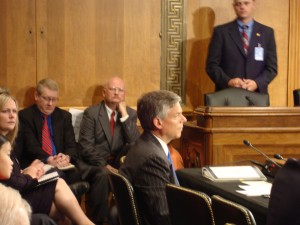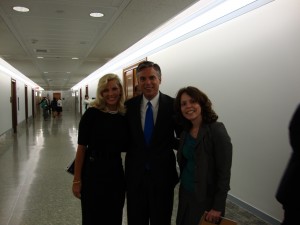The Hunt for a New China Policy: A Review of the Jon Huntsman Confirmation Hearing

Gov. Jon Huntsman at his confirmation hearing, July 23, 2009
Originally posted on ChinaGeeks
Thursday’s Senate confirmation hearing for the next ambassador to China was a virtual love-fest from both sides of the aisle. Democratic senators gushed about Utah Gov. Jon Huntsman’s China background and Mandarin language skills and Republican senators John McCain, Orin Hatch and Bob Bennett attended the hearing to show their ardent support for the nominee. There is little doubt that Gov. Huntsman – a Republican governor, nominated as Ambassador to China by a Democrat president – will be confirmed on Tuesday when the full Senate meets to vote on his nomination. But his confirmation hearing still proved a telling sign of the Administration’s priorities in its relationship with China (nominees are always prepped for weeks prior to their hearing by Administration officials).
In his opening statement Gov. Huntsman stressed the importance of working with China on two high-priority fronts: first, repairing the international economy and second, maintaining peace and stability in Northeast Asia. In what was likely a nod to the Chinese government and an acknowledgement of the increasing tension with North Korea as illustrated by Secretary of State Hillary Clinton’s recent trip to Asia, Gov. Huntsman highlighted China’s leadership in organizing the six-party talks and commended China on working closely, and successfully, with the U.S. and the U.N. Security Council in dealing with North Korea. Gov. Huntsman also mentioned other areas where the U.S. and China must continue to work together: advancing global counter-terrorism efforts, stopping the spread of weapons of mass destruction, combating extremism and promoting stability in Afghanistan and Pakistan, and promoting better governance and development in places like Sudan, Burma and Zimbabwe.
Most people believe that President Obama nominated Gov. Huntsman solely for strategic reasons – to eliminate a strong Republican presidential candidate in 2012. But that could easily be only partially true. Another reason is that Gov. Huntsman is actually a very good pick to represent the U.S. in a relationship that has become much more delicate as it becomes more important. Gov. Huntsman has a strong China background, experiencing first-hand Chinese societies in Taiwan (during his time as a Mormon missionary) and Singapore (as Ambassador). Additionally, during the hearing, Gov. Huntsman supported continued human rights discussions with the Chinese, criticizing our current approach as too “on-again-off-again.” Instead he advocated for a regularized and systematic forum where issues such as freedom of religion, freedom of speech, rule of law, and access to information can continuously be discussed. While some might argue that this was mere political posturing to secure votes from Congress, Gov. Huntsman’s statement is a noted departure from Secretary Clinton’s recent announcement that human rights cannot interfere with our handling of other crises. Such a departure provides credibility that Gov. Huntsman sincerely wants to make human rights issues a regular part of his dialogue with the Chinese. Also, his experience in Taiwan and Singapore provide him with the alternative perspective that economic development in a culturally-Chinese society does not necessarily require the authoritarian regime that currently exists on the mainland.
Although Gov. Huntsman’s approach to human rights is slightly different from the Administration’s, he whole-heartedly supports the Administration’s focus on climate change in U.S.-China relations, deviating from many of his Republican colleagues. In discussing caps on greenhouse gases, Gov. Huntsman maintained that the U.S. should support an agreement on climate change with China, viewing any agreement as an economic, exporting opportunity. The U.S. will become a leader in clean air and energy efficiency industries, industries that he argued would likely dominate the global economy for the next 20 to 40 years. Unfortunately, Gov. Huntsman did not address the intellectual property concerns of exporting U.S. clean energy technology to China, a thorny issue that will certainly prove tricky in any discussions on climate change.
The nomination of Gov. Huntsman is a telling signal that the Obama Administration perhaps grasps the realities of the new China. The China today is not the China that existed 30 years ago when the U.S. first normalized relations. In only the past few years, China has quickly emerged as a global leader with a strong economy, large militarily and significant influence on other countries. Today, the U.S. negotiates with a power that in many ways is its equal; one that can easily walk away from the negotiating table. For the next few years, the U.S. and China will have to be able to cooperate on a myriad of tough issues that could impact the future of our world order – climate change, trade, humanitarian crises, currency, terrorism, just to name a few. It is important to have a representative in Beijing who understands how to effectively negotiate with the Chinese and find common ground between our two nations, but at the same time is willing to stand his ground when our interests diverge, which, at times, will be unavoidable. Gov. Huntsman, with his knowledge of Chinese culture, language skills, and his courage to buck his own party and accept the nomination, could likely be the best person for the job.

Gov. Huntsman, his wife and the author (on the right) after the confirmation hearing
 On Facebook
On Facebook By Email
By Email 